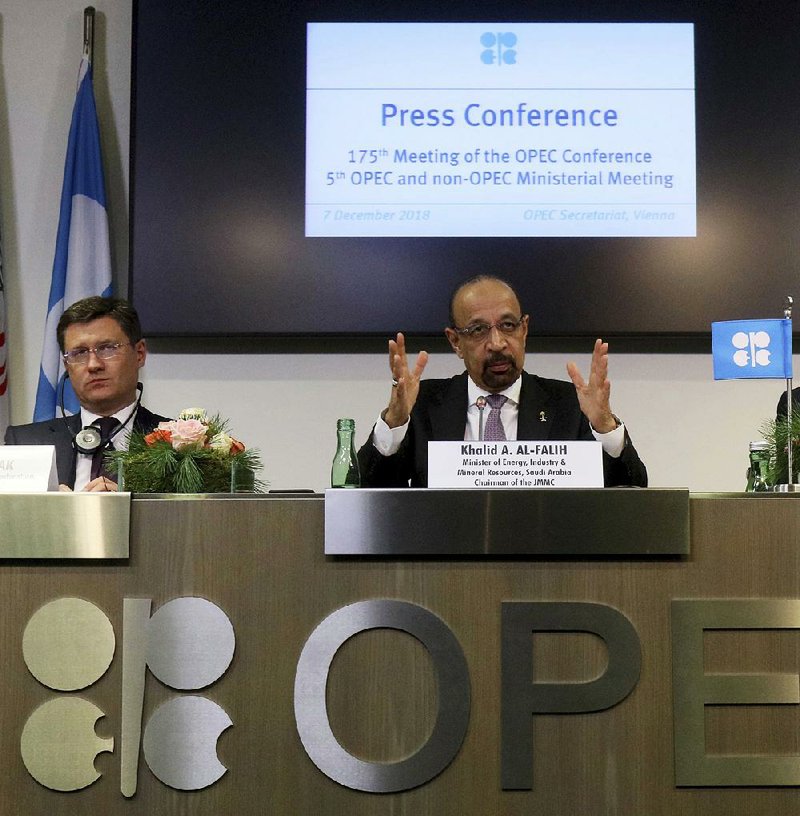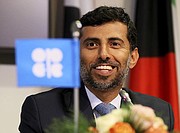VIENNA -- Oil prices spiked sharply higher Friday as major oil producers, including the OPEC cartel and Russia, agreed to cut global oil production by 1.2 million barrels a day, 20 percent more than previously discussed, to reduce oversupply.
After two days of meetings, OPEC nations, which include Saudi Arabia and Iraq, said they would cut 800,000 barrels per day for six months from January, though some countries such as Iran, which is facing wide-ranging sanctions from the United States, have been given an exemption.
The balance will come from Russia and other non-OPEC countries. The United States, one of the world's biggest producers, is not part of the deal.
"This is a major step forward," said Suhail Mohamed al-Mazrouei, the United Arab Emirates' energy minister who chairs the regular meetings in Vienna as president of the OPEC Conference.
Oil producers have been under pressure to reduce production after a sharp fall in prices over the past couple of months. The price has fallen about 25 percent recently because major producers -- including the U.S. -- are pumping oil at high rates.
The reduction has certainly met with the response hoped for by ministers as it was at the upper end of most predictions. After the announcement, Brent crude, the international standard, was up $2.79 a barrel, or 4.7 percent, at $62.85. Benchmark New York crude was $2.11, or 4.1 percent, higher at $53.60 a barrel.
Ann-Louise Hittle, a vice president at oil industry expert Wood Mackenzie, said the production cut "would tighten" the oil market by the third quarter next year and help lift Brent prices back above $70 per barrel.
"For most nations, self-interest ultimately prevails," she said. "Saudi Arabia has a long-term goal of managing the oil market to avoid the sharp falls and spikes, which hurt demand and the ability of the industry to develop supply. On top of this, Saudi Arabia also needs higher oil revenues to fund domestic Saudi spending."
Russian Energy Minister Alexander Novak called the negotiations with the OPEC nations "fairly challenging" but said the decision "should help the market reach a balanced state."
"I think this is a strong signal to anybody who has doubted it that our cooperation is continuing and we can react to any challenge the market throws at us," he said in Russian through a translator.
OPEC's reliance on nonmembers like Russia highlights the cartel's waning influence in oil markets, which it had dominated for decades. The OPEC-Russia alliance was made necessary in 2016 to compete with the United States' vastly increased production of oil in recent years.
By some estimates, the U.S. this year became the world's top crude producer.
The cut is unlikely to be greeted warmly by President Donald Trump, who has been pressuring the cartel publicly to maintain production. On Wednesday, he tweeted: "Hopefully OPEC will be keeping oil flows as is, not restricted. The World does not want to see, or need, higher oil prices!"
One stumbling block to an agreement had been Iran, Saudi Arabia's regional rival and fellow OPEC member, which had been arguing for an exemption to any cuts because its crude exports are being pinched already by U.S. sanctions.
Al-Mazrouei said that in the end, Iran had been given an exemption, as well as Venezuela and Libya.
That "means that the percentage we will contribute among us is going to be a bit higher," he said.
Despite Friday's market reaction, some analysts said Saudi Arabia and Russia -- two of the world's three biggest oil producers, along with the United States -- might just be pushing back a reckoning for a few months. They noted that supplies from the United States, mainly from shale producers, had been increasing faster than most analysts expected a few months ago.
"The OPEC-plus cuts announced today fall short of the amount needed to prevent large stock builds early next year given the supply tsunami underway," said Robert McNally, president of Rapidan Energy Group, a market research firm.
McNally was also skeptical that there would be full compliance with the agreement, noting that with the exception of Saudi Arabia and Russia, it was not clear how the cuts would be allocated.
In 2014, the U.S. oil industry's fate seemed to rest in the hands of OPEC ministers who were flooding the market with cheap oil. Now, the cartel is in full retreat, agreeing to cut output to keep their own economies healthy even as U.S. production continues to surge.
The move came in a week in which oil fell to near $50 a barrel, a price that four years ago would have panicked U.S. drillers. But since then, shale explorers have cut costs, boosted fracking efficiency and made wells last longer and produce more.
"The shale industry can now thrive in a $50 oil world," David Deckelbaum, a New York-based analyst at Cowen & Co., said by phone. The OPEC decision to support prices over $50 in the U.S. "underwrites most of the industry."
U.S. producers are now generating 11.7 million barrels of oil a day, about a third more than in 2014, with almost half the number of rigs. And last week, the industry became a net exporter for the first time in 75 years.
Information for this article was contributed by Anthony Mills, Kiyoko Metzler and David Rising of The Associated Press; by Stanley Reed of The New York Times; and by Kevin Crowley of Bloomberg News.
A Section on 12/08/2018

